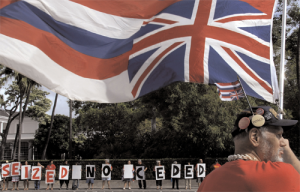Blog
News, updates, finds, stories, and tidbits from staff and community members at KAHEA. Got something to share? Email us at: kahea-alliance@hawaii.rr.com.
10-to-1 opposed and they still passed it
From Marti: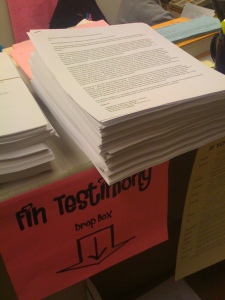
The bill to transfer management of the sacred summit of Mauna Kea to the University of Hawaii passed the state’s House Finance Committee on Tuesday. By the Committee’s own count, 900 people submitted testimony in opposition to the 10 or so in support. This number is not counting the testimony submitted by a dozen Kanaka Maoli (Native Hawaiian) scholars who signed a joint letter in opposition to the bill, as well as testimony from the Hawaii Sierra Club, the Royal Order of Kamehameha I, and several individual Native Hawaiian cultural practitioners detailing the history of destruction and desecration from the University’s 40 years of telescope construction on the summit.
This bill is extremely dangerous for the future of our sacred summit and all of our conservation lands. It gives the University – the developer of the summit – control over what happens to the natural and cultural resources of the conservation district that currently protects the entire summit of the mountain, setting a terrible precedent for delegating the state’s conservation responsibilities to developers.
The bill would also allow the University to establish its own private police force on the summit. These “rangers” do not have the same level of training or authority as the state resource enforcement officers who currently have jurisdiction over the summit. In fact, these “rangers” themselves have engaged in desecration of cultural sites, interfered with spiritual and religious practice on the summit, and endangered unique, fragile natural resources.
In addition, the bill would allow the University to pocket state money with no oversight by establishing a special fund. For 40 years, the University has facilitated the theft of state money by foreign telescope owners who construct massive telescope facilities (and all of the gift shops, parking lots, and other support structures that go with them) on state land without paying rent to the state. In addition, millions in profits is made from the sale of patented information developed on the summit. Instead of offering to pay some of this back-rent (to help the state avoid drastic budget cuts), the University is proposing to legitimatize this history of theft by establishing a special fund into which revenue from the summit is deposited and from which only the University can withdrawal.
The bill will now move to the state Senate for additional committee hearings. If you care for the sacred summit of Mauna Kea and the integrity of conservation management in Hawaii, then now is the time to speak up. For 10 years, the public has asked for the same four things:
1. A legitimate management plan - This is a plan that protects the natural and cultural resources of the summit from unreasonable development. It is prepared and approved by the Board of Land and Natural Resources and accepted by the community.
2. An independent management board – the current set up is a puppet of the University with members chosen and paid by the University.
3. Fair Representation – the independent management board must include Kanaka Maoli and environmental representatives that serve in a meaningful decision-making role beyond just merely “advisory.”
4. Fair Compensation - while no one, but the University, knows for sure how much profit is made off the summit, some estimates put it at $50-60 million a year. If the telescopes paid just that for the 40 years of back-rent owed to the state, taxpayers would earn $2 billion dollars.
You can help protect Mauna Kea. Take action now! Click here and submit a personalized letter to Hawaii’s legislators.
To help inspire you, here are excerpts from a few that have already been sent:
“I strongly oppose the University’s plans for the future of Mauna Kea. Enough is enough. The summit lands are ecologically sensitive and culturally sacred. Expansion of astronomy’s footprint on the mountain should not be an option. If a new telescope is truly needed, dismantle an old one. Mauna Kea should be available to the akua and to the people and to the scientists– in a way that puts pono first. Pono, meaning, in righteous balance for all concerned. You are our elected and appointed representatives, charged with the responsibility to excecute the wishes of the people, the caretakers of this land– not the empowered elite. Mauna Kea Summit is a conservation area and what remains should remain kapu. Protect it.
Mahalo,
Z Johnson
Honokaa, Hawaii“
—-
“Aloha no –
I would like to add my voice to those protesting UH’s plans for the future of Mauna Kea. I am a huge fan of the science that is done in the observatories; however, this MUST be balanced with the rights of Kanaka Ma’oli and the needs of the environment.
Mahalo,
David Edelstein
Seattle, Washington”
—-
“I strongly oppose the University’s plans for the future of Mauna Kea. We should learn from the flaws of past Land Board mismanagement on Mauna Kea, keep the laws that protect Mauna Kea now, and exercise management authority towards the protection and restoration of this “wahi pana”, sacred place.
Mauna Kea is ceded lands. The unrelinquished claims of the rightful beneficiaries have yet to be settled!!!
For these reasons, I urge a strong stand for Mauna Kea. Uphold the protections currently in place, and preserve what is left of Mauna Awakea for it’s sacred purpose. It is our Kuleana – our Responsibility toward Akua (Creator) and the coming generations!!!
Mahalo,
Luana Jones
Pahoa, Hawaii”
—-
“POP DA PIMPLES: BEFORE YOU LOOK INTO SPACE, YOU NEED TO MALAMA THIS PLACE….MAUNA A WAKEA!!!!”
Malama i ka ‘aina a me na kupuna,
Leimomi Wheeler
Kea’au, Moku Nui“
—–
“Aloha,
I am a UH-Hilo alumni from 2004 and now live in my home state of Minnesota. I am deeply dismayed by the continued breach of ethics and law by the school where I earned my degree. It is embarrassing for the state of Hawaii to continue to let these institutions bulldoze their cultural heritage and environmental resources in the name of scientific advancement. Hawaii is becoming a sad cliche in management of resources and in the treatment of indigenous peoples.
Has the astronomy community not taken enough land and proven enough mismanagement of what they have already taken? Isn’t it time for Hawaii to join the modern world and learn mistakes of the past and err on the side of protection and conservation? Once these sacred places and natural resources are taken, they are gone forever. They will become a paragraph in a history book on yet another breach of trust between government and its local population.
I did my UH Environmental Impact Statement paper in college on the Mauna Kea Plan. It didn’t take a masters degree to see how many laws have been violated or skirted around. I have many fond memories of hiking on Mauna Kea and respect and want to extend my support from afar for those who continue to try to preserve what is left.
Jennifer Johnson
Minnesota”
—-
“I vehemently oppose the University’s plans for the future of Mauna Kea. The lands of Mauna Kea are ecologically unique and culturally significant that is why they are protected as a conservation district. Conservation — not telescope construction — must be focus of all activity there.
Mahalo,
Valerie Loh
Honolulu, Hawaii”
Half Way To Victory!

Beach access got a real boost today. Hawaii’s Senate Judiciary Committee just passed SB 1088, which will help to improve enforcement of public access rights to the shoreline and inland recreational areas. Yay!
Big Mahalos to everyone who submitted testimony! There is still a chance to help out in this important effort.
The bill is ready to “cross over” to the House of Representatives, where it will go through a similar committee hearing process. Unfortunately, the first committee that will likely hear this bill declined to hear a similar bill in the past.
To ensure that SB 1088 does not suffer the same fate, please take a moment to contact the Committee’s chairperson, Representative Ken Ito either at 808-586-8470 or repito@capitol.hawaii.gov. Just leave a nice message encouraging him to hear the bill and help protect beach access in Hawaii.
We can start collecting testimony now in support of this bill by encouraging friends, family, and all outdoor lovers to visit our nifty virtual testimony table. Watch for action alerts in your inbox next month calling for public testimony in support of this and other bills that protect the public’s right to open and safe beach access. You can sign up with our email action alert network by clicking here.
Ceded Lands Supreme Court Oral Arguments Online
Transcript of today’s Supreme Court Oral Arguments are already online: http://www.supremecourtus.gov/oral_arguments/argument_transcripts/07-1372.pdf
(Thanks to iLind.net for the tip.)
Bad Mauna Kea Bills Move Through Legislature
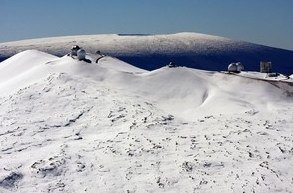
From Rob Perez’s excellent coverage of the Mauna Kea bills currently moving through the state legislature:
Two bills (HB 1174 and SB 502) giving UH authority over the 11,000-plus acres of ceded lands it leases from the Department of Land and Natural Resources have been approved by two committees each in the House and Senate, worrying environmentalists, Native Hawaiian groups and others.
The bills permit UH to regulate public and commercial uses of the land, and critics believe that authority would be broadly applied. Lawmakers call the legislation a “work in progress.”
“This is a very, very bad idea,” said Marti Townsend, program director of KAHEA: The Hawaiian-Environmental Alliance.
Critics say transferring such oversight to UH would be a huge mistake in light of the school’s poor track record on Mauna Kea and the dangerous precedent the action would set, essentially turning over responsibility for the land to its leaseholder or developer.
See full article at: http://www.honoluluadvertiser.com/article/20090222/NEWS03/902220351/1001
Kanaka Scholars Stand Up for Mauna Kea
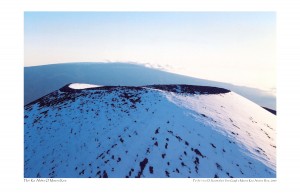 Mahalo nui loa to the dozens of Kanaka Maoli (Native Hawaiian) scholars who submitted this statement in support of protecting the sacred summit of Mauna Kea. The University of Hawaii is seeking to take over control of the summit from the Department of Land and Natural Resources because they lost the lawsuit in 2007 that held the DLNR must manage the summit for the conservation of the natural and cultural resources there, not telescope construction. For 40 years, the University of Hawaii has facilitated the destruction of the public trust lands on the summit by foreign corporations that own and operate dozens of telescopes. You can take action, too, by submitting testimony online – just click here.
Mahalo nui loa to the dozens of Kanaka Maoli (Native Hawaiian) scholars who submitted this statement in support of protecting the sacred summit of Mauna Kea. The University of Hawaii is seeking to take over control of the summit from the Department of Land and Natural Resources because they lost the lawsuit in 2007 that held the DLNR must manage the summit for the conservation of the natural and cultural resources there, not telescope construction. For 40 years, the University of Hawaii has facilitated the destruction of the public trust lands on the summit by foreign corporations that own and operate dozens of telescopes. You can take action, too, by submitting testimony online – just click here.
Kanaka Maoli Scholars Against Desecration
Statement on Mauna Kea – February 17, 2009
We declare our opposition to SB 992/HB 1174 and SB 502/HB 1370 and any other legislation bills that would transfer Mauna Kea to the University of Hawai`i (UH). These current legislative proposals would give the UH complete management authority over Mauna Kea and allow implementation of a plan that has no limit on telescope construction, would close public access to the summit, and exempt UH from public oversight in the name of development.
Mauna Kea is a sacred summit, which is already being desecrated by the existing science telescopes. The Hawai`i revised statute 711-1107 on desecration specifically states that no one may commit the offense of desecrating “a place of worship or burial,” and the statute defines “desecrate” as “defacing, damaging, polluting, or otherwise physically mistreating in a way that the defendant knows will outrage the sensibilities of persons likely to observe or discover the defendant’s action.” If this legislation passes, state legislators would be violating their own state law.
These legislative proposals also interfere with on-going litigation on the current regulations governing Mauna Kea. We would also like to remind state representatives and the general public that in the recent Third Circuit Court case regarding the management of Mauna Kea, the court ruled in favor of the Plaintiffs—Kealoha Pisciotta, President of Mauna Kea Anaina Hou; Debbie Ward and Nelson Ho, Co-Chairs of Mauna Kea Issues Committees, Sierra Club Hawai`i Island Chapter; Ali`i `Ai Moku, Paul K. Neves of the Royal Order of Kamehameha I, Moku of Mamalahoa Heiau Helu `Elua; and Clarence Ku Ching, individual Native Hawaiian Practitioner—and against the UH and the state Board of Land and Natural Resources (BLNR) for violation of the regulations protecting Mauna Kea as a conservation district. This lawsuit is currently on review before the Intermediate Court of Appeals (ICA) after the University appealed the lower court ruling against them. Though the University only recently withdrew its appeal from the ICA, counterclaims that go to the fundamental merits of this issue remain before the ICA.
Besides blatant desecration, and interference in on-going litigation, the negative environmental effects are numerous. As noted in the Testimony of the Plaintiffs regarding this legislation, two reports by the State Auditor have found that UH’s misuse and the BLNR’s failed oversight is “inadequate to ensure the protection of natural resources, and neglected …the cultural value of Mauna Kea.” Their report further stated that the University’s Institute for Astronomy “focused primarily on the development of Mauna Kea and tied the benefits gained to its research program,” and that its focus on telescope construction has been “at the expense of neglecting the site’s natural resources.” Also, in 2005, an Environmental Impact Statement required by federal court order found that the cumulative impact of telescope activities on Mauna Kea has had a “substantial, adverse, and significant” impact.
The current proposals also violate the land claims of the Hawaiian nation. These legislative attempts to transfer a portion of the Hawaiian Kingdom Crown and Government Lands of which Mauna Kea is a part, is in direct contravention of the Hawai`i State Supreme Court’s holding in OHA v. Housing and Community Development Cororation of Hawai`i, 2008. The Hawaii Supreme Court barred the transfer of this land base by the state. If this legislation passes, state legislators would be violating the state Supreme Court ruling.
This exploitative venture proposed by this legislation must be stopped because the entire scheme promotes the ongoing violation of the sacred summit of Mauna Kea; it would be irresponsible and bad public policy, as well as a continued abuse of state power.
J. Leilani Basham, Ph.D., Assistant Professor, Hawaiian Studies, University of Hawai`i at West O`ahu
Kamanamaikalani Beamer, Ph.D., Mellon-Hawai`i Postdoctoral Fellow, Kohala Center
Maenette K.P. Ah Nee-Benham, Ed.D., Dean of Hawai`inuiakea School of Hawaiian Knowledge, University of Hawai`i, Mānoa
Kealani Robinson Cook, Ph.D. Candidate, Department of History, University of Michigan
J. Noelani Goodyear-Ka`ōpua, Ph.D., Assistant Professor, Political Science, University of Hawai`i at Mānoa
Lisa Kahaleole Hall, Ph.D., Assistant Professor, Women’s Studies, Wells College
Sydney Lehua Iaukea, Ph.D., Mellon-Hawai`i Postdoctoral Fellow, Kohala Center
Kū Kahakalau, Ph.D., founder and director of Kanu o ka ‘Āina New Century Public Charter School
Lilikalā Kame`eleihiwa, Ph.D., Professor, Kamakakūokalani Center for Hawaiian Studies, University of Hawai`i at Mānoa
Val Kalei Kanuha, Ph.D., M.S.W., Associate Professor of Sociology, University of Hawai`i at Mānoa
Kēhaulani Kauanui, Ph.D., Associate Professor, Anthropology and American Studies, Wesleyan University
Brandy Nalani McDougall, Ph.D. Candidate, English, University of Hawai`i, Mānoa
Noenoe K. Silva, Ph.D., Associate Professor, Political Science, University
of Hawai`i at Mānoa
Ty Kawika Tengan, Ph.D., Associate Professor, Anthropology and Ethnic Studies, University of Hawai`i at Mānoa
Lani Teves, Ph.D. Candidate, Program in American Culture, University of Michigan
Haunani-Kay Trask, Ph.D., Professor, Kamakakūokalani Center for Hawaiian Studies, University of Hawai`i, Mānoa
Liza Keanuenueokalani Williams, Ph.D. student, New York University
Defend the Sacred Summit of Mauna Kea
Your help is needed right now. Lobbyists for the University of Hawaii, backed by powerful foreign telescope-developers, are pushing hard to take control of Mauna Kea’s public trust resources and override the conservation laws currently barring further development on our sacred summits. If successful, they will use this authority to write their own rules, approve their own permits, and shut-out the public. Public trust resources cannot be protected if the developers are allowed to police themselves.
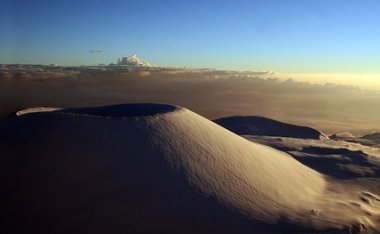
You can help stop UH’s land-grab on Mauna Kea’s sacred summit. After 40 years of mismanagement, tell the State Land Board and the Legislature that enough is enough!
“The University’s lobbyists will say anything to get their way. I heard them tell Legislators they had community consent. I am from the community and tell you what, they have nothing of the sort.” — Kukauakahi Ching, Native Hawaiian Practitioner.
Our sacred summits — Mauna Kea and Haleakala — are protected by law as conservation districts. These are public trust ceded lands–Hawaiian lands–held by the state in trust for the people of Hawaii. Yet, today Mauna Kea’s public lands are exploited by foreign corporations and the University, who are profiting from telescope activities on the summit at the public’s expense.
“The rent from the foreign telescope-owners is 30 years past due–they have paid only $1 a year to misuse Mauna Kea. If the state had been collecting the $50 million dollars a year from these foreign telescope-owners, like we suggested to them years ago, we would not have these budget shortfalls now. Remember, $50 million in 1 year is $100 million in just 2 years. They owe the people of Hawaii for 30 years of back rent. How dare they suggest to short-change the taxpayers now.” –Kealoha Pisciotta, President Mauna Kea Anaina Hou.
Forty years of uncontrolled telescope construction has desecrated cultural sites, contaminated the ground above the primary aquifer, and destroyed 90% of the endemic Wekiu’s habitat. Today, developers are vying to build two new telescopes (along with roads, parking lots, office buildings, and gift shops) on undeveloped habitat around the summit area. One of them — owned by the California Thirty Meter Telescope Corporation — is larger than all the current telescopes combined and will bulldoze the last pristine peak near the summit.
The only thing stopping them is the law. That is why the University is working hard to overturn the laws that currently protect our sacred summits and limit telescope construction. Two courts of law and two state audits have already found that the telescope industry violated the state and federal laws meant to protect Mauna Kea. The only way their future telescope construction plans can go forward is for the University and the telescope developers to change and exempt themselves from these protective environmental laws.
This latest bid to take over Mauna Kea has two fronts:
1. Pressure the Land Board to adopt an illegitimate management plan that limits public access, dictates religious ceremony, and allows UH and telescope developers to pocket public money,
2. Lobby the Legislature to pass one of four bills that will hand-over authority for managing Mauna Kea to the primary developer of the summit, the University of Hawaii.
All of it comes down to the University’s same, long-sought goal: make it easier to exploit Mauna Kea for money. The latest proposal on the table would allow the University to restrict public access (including how and when Hawaiians may worship at the sacred summit), pocket all the money made on Mauna Kea, and exempt themselves from public oversight. This is a public policy and legal nightmare!
“The University wants to gate the road to Mauna Kea–the road was paid for by taxpayers, it’s a public road. The University wants to require Hawaiians to get a permit to worship–Mauna Kea belongs to Ke Akua, they cannot lock the people out of the temple. Even if Hawaiians could get a permit, it would mean they couldn’t bring their non-Hawaiian friends and ohana to ceremony. This is discrimination! Who is the University to say who can and cannot worship?” — Paul Neves, Alii Ai Moku, Royal Order of Kamehameha I.
Your voice can help preserve the sacred temple and delicate ecosystem of Mauna Kea. Take action now to tell the Legislature and the Land Board that Mauna Kea is still not for sale.
Tightening the Grip of the State
From our intern, Koa Luke:
Unfortunately, this is something that has been severely abused; no programs or land from these ceded/seized lands was ever created or given to the descendants of the Hawaiian Kingdom. Instead, these lands are abused and used by the state for things such as the Honolulu International Airport and the University of Hawai’i Manoa campus where Hawaiians are sorely underrepresented in the student population.
One of the administration’s main arguments is that the 1993 has no legal standing and its writ claims the apology bill is merely symbolic. On their website, www.stopsellingcededlands.com, Kupu ’Aina correctly explains that “allowing the sale of ceded lands before those claims are resolved is detrimental because it reduces the bargaining power of the Native Hawaiian community to resolve these claims.”

